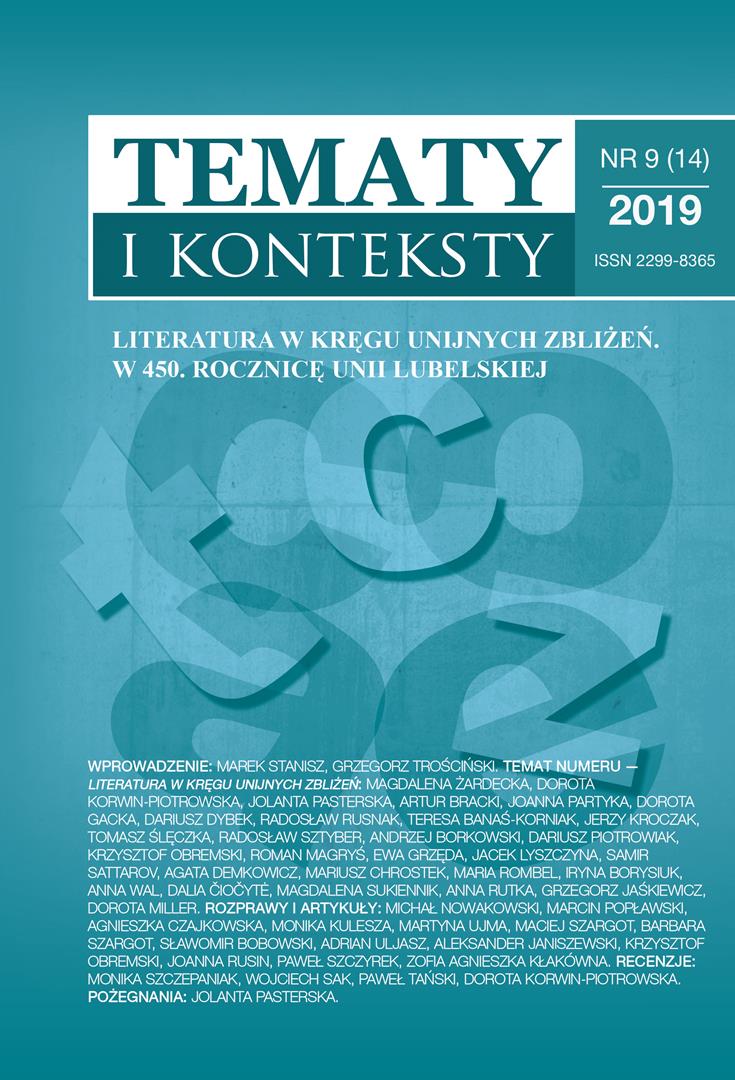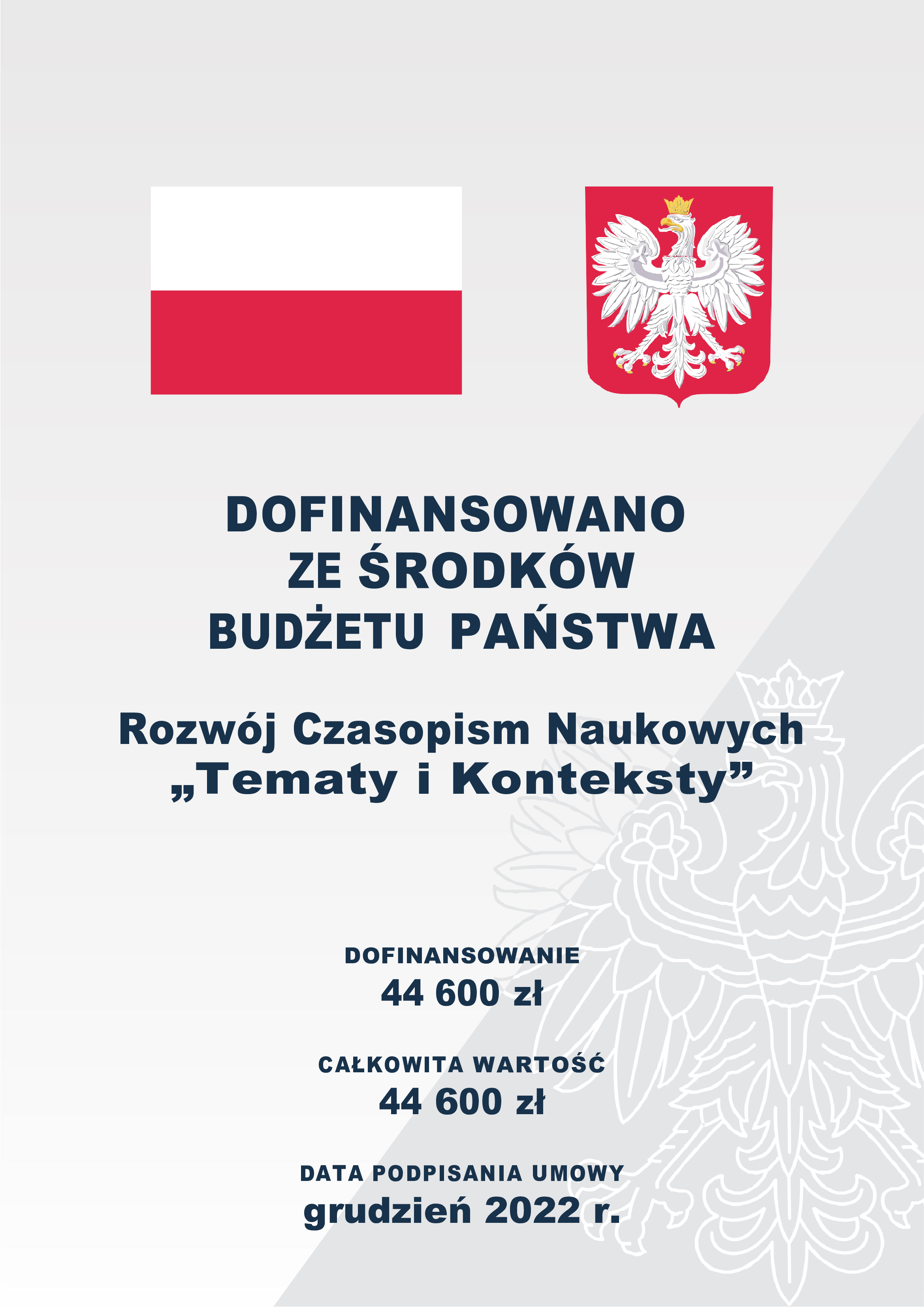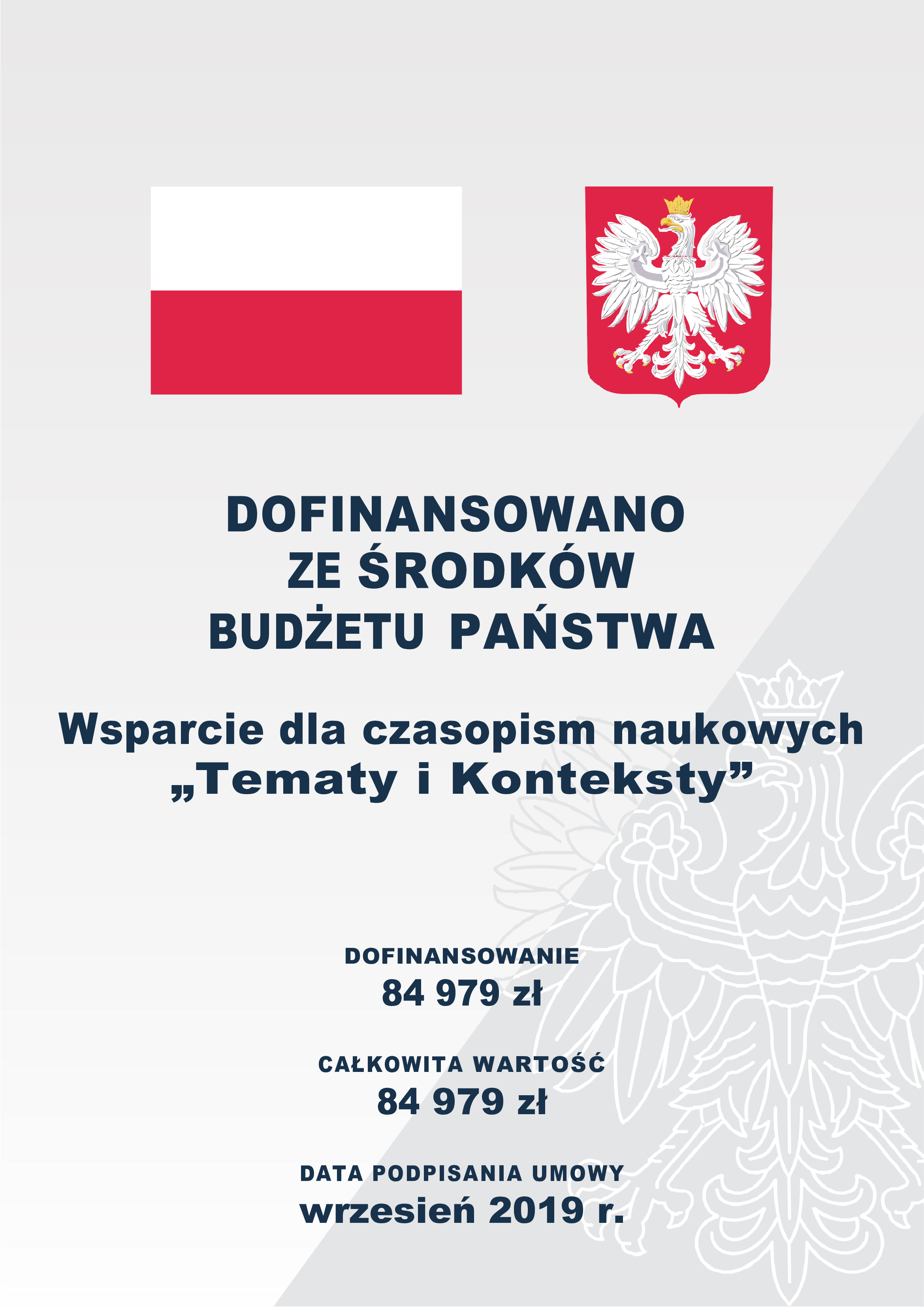Przedunijne nadzieje i obawy kryjące się za obrazem średniowiecznych władców zawartym w Rozmowie Polaka z Litwinem (1564)
DOI:
https://doi.org/10.15584/tik.2019.7Słowa kluczowe:
literatura renesansowa, Stanisław Orzechowski, Augustyn Mieleski Rotundus, dialog polityczny, historia średniowiecza, unia polsko-litewska, królowie Polski, cesarze niemieccyAbstrakt
Conversation of a Pole with a Lithuanian, written by Augustine Mieleski Rotundus in July or August 1564, was an answer to the political dialogue titled Quincunx. The dialogue was authored by Stanislaus Orzechowski. In his work he ordered Lithuanians to enter the union with Poland, but in the same work he named them slaves and people deprived of freedom. He also expressed the view that only citizens of kingdoms are free and Lithuanians as inhabitants of a duchy have no liberty. Augustine Rotundus replied to him that not all kingdoms enjoy freedom: citizens are free if they have a good ruler.
The present paper consists of two parts. In the first part, I present participants of polemics of 1564 and their dialogues, which are written according to ancient rules. In the second part, I quote the medieval threads from Conversation, in which Rotundus talks about rulers of Poland and emperors of Germany. He proves that Polish kings were not always good rulers. Sometimes dukes were better than kings. Therefore the Grand Duchy of Lithuania is not worse than the Kingdom of Poland. Medieval threads also exhibit preunion hopes and fears of the Lithuanians. We find here the picture of the state and the portrait of the ruler which wanted by them. The state should have a Christian character and law which is well constructed. Furtherly, the ruler should be wise, willing to cooperate with the Church, independent of his wife and free of excessive ambition.
Downloads
Bibliografia
Anonim tzw. Gall, Kronika polska, przeł. R. Grodecki, wstęp i oprac. M. Plezia, Wrocław–Warszawa–Kraków 2008, s. 20.
Anonymi G., Cronicae et gesta ducum sive principum Polonorum, edidit, praefatione notisque instruxit Maleczyński C., seria: Monumenta Poloniae Historica. Nova Series, t. II, Cracoviae 1952, s. 19.
Bardach J., Krewo i Lublin. Z problemów unii polsko-litewskiej, „Kwartalnik Historyczny” 1969, 76, s. 583–619.
Bibliografia literatury polskiej. Nowy Korbut. Piśmiennictwo staropolskie, oprac. zespół pod kier. R. Pollaka, t. 3: Hasła osobowe N–Ż, Warszawa 1965, s. 47–57, 179–181.
Bielski M., Kronika polska, Kraków 1597, s. 128.
Bielski M., Kronika wszystkiego świata, Kraków 1551.
Cicero M.T., Paradoxa Stoicorum, 36, tekst dostępny on line: http://www.thelatinlibrary.com/cicero/paradoxa.shtml
Cromeri M. […] Polonia sive de origine et rebus gestis Polonorum libri XXX, Coloniae Agrippinae 1589, lib. VI, s. 109.
Cronica Petri comitis Poloniae wraz z tzw. Carmen Mauri (Cronica Petri comitis Poloniae accedunt Carminis Mauri fragmenta), wyd. M. Plezia, seria: MPH SN, t. 3, Kraków 1951.
Dąbrówka A., Poeta i polityka, w: Wiązanie sobótkowe. Studia o Janie Kochanowskim, red. E. Lasocińska i W. Pawlak, seria: „Studia Staropolskie. Series Nova”, t. XLIII (XCIX), Warszawa 2015, s. 203–217.
Dąbrówka I. de, Commentum in Chronicam Polonorum Magistri Vincentii dicti Kadłubek, edidit, praefatione notisque instruxit Marianus Zwiercan, adiuvantibus A.S. Kozłowska et M. Rzepiela, Kraków 2008.
Długosz J., Roczniki czyli kroniki sławnego Królestwa Polskiego, red. J. Dąbrowski i K. Pieradzka, tłum. zbiorowe, od t. 2 – J. Mrukówna, t. 1–10, ks. 1–12, Warszawa 1961–2004.
Dobosz J., Monarchia i możni wobec Kościoła w Polsce do pocz. XIII w., Poznań 2002.
Duczmal M., Jagiellonowie. Leksykon biograficzny, Kraków 1997.
Helcel A.Z., Starodawne prawa polskiego pomniki, poprzedzone wywodem historyczno-krytycznym tak zwanego Prawodawstwa Wiślickiego Kazimierza Wielkiego, t. 1, Warszawa–Kraków 1856.
Hube R., Prawo polskie w XIV wieku: ustawodawstwo Kazimierza Wielkiego, Warszawa 1881.
Jasiński K., Rodowód Piastów małopolskich i kujawskich, Poznań–Wrocław 2001, s. 167–168.
Kelly J.N.D., Encyklopedia papieży, Warszawa 1997, s. 138–140.
Kochanowski J., Dzieła polskie, t. II, oprac. J. Krzyżanowski, Warszawa 1969, s. 189–206.
Kotarski E., Wróżki Jana Kochanowskiego, „Odrodzenie i Reformacja w Polsce” 1980, 25, s. 79–98.
Kutrzeba S., Związek Litwy z Polską w latach 1386–1401, w: Polska i Litwa w dziejowym stosunku, Warszawa 1914, s. 458, 479–481.
Manteuffel T., Historia powszechna. Średniowiecze, wyd. VII, Warszawa 1994.
Melanthonis P., Philosophiae moralis epitomes libri duo emendati et aucti, Argentorati apud Cratonem Mylium, 1546.
[Mieleski Rotundus A.], Rozmowa Polaka z Litwinem (1564), wyd. Józef Korzeniowski, Kraków 1890, s. 1–80.
Niedźwiedź J., Nowa edycja traktatu Andrzeja Wolana o wolności, „Terminus” 2011, 12, z. 24, s. 152.
Orzechowski Okszyc S., Quincunx, to jest wzór Korony Polskiej na cynku wystawiony, wyd. Kazimierz Józef Turowski, Kraków 1858, s. 1–113.
Pietrzyk-Reeves D., Stanisława Orzechowskiego i Augustyna Rotundusa debata o Rzeczypospolitej – recenzja, „Politeja” 2011, 1(15), s. 561.
Polski słownik biograficzny, t. IV, Kraków 1938, s. 165–166; t. XXV, Wrocław–Warszawa–Kraków–Gdańsk 1980, s. 575; t. XXXII, Wrocław–Warszawa–Kraków, s. 315–318; t. XXXIV, Wrocław–Warszawa–Kraków–Gdańsk, 1979, s. 287–292.
Słownik władców Europy średniowiecznej, red. J. Dobosz i M. Serwański, Poznań 1998.
Słownik władców polskich, oprac. J. Dobosz i in., Poznań 1997.
Stanisława Orzechowskiego i Augustyna Rotundusa debata o Rzeczypospolitej, wstęp i oprac. K. Koehler, tłum. z jęz. łacińskiego E. Buszewicz, Kraków 2009.
Stanisława Orzechowskiego polskie dialogi polityczne (Rozmowa wokół Egzekucyjej i Quincunx), wyd. Jan Łoś, Kraków 1919.
Stryjkowski M., Kronika polska, litewska, żmódzka i wszystkiej Rusi, wydanie nowe będące dokładnem powtórzeniem wydania pierwotnego królewieckiego z roku 1582, poprzedzone wiadomością o życiu i pismach Stryjkowskiego przez Mikołaja Malinowskiego oraz rozprawą o latopisach ruskich przez Daniłowicza, pomnożone przedrukiem dzieł pomniejszych Stryjkowskiego według pierwotnych wydań, t. I i II, Warszawa 1846.
Stryjkowski M., O początkach, wywodach, dzielnościach, sprawach rycerskich i domowych sławnego narodu litewskiego, żemojdzkiego i ruskiego, przedtym nigdy od żadnego ani kuszone, ani opisane, z natchnienia Bożego a uprzejmie pilnego doświadczenia, oprac. J. Radziszewska, Warszawa 1978.
Ślaski J., Polskie dialogi polityczne Stanisława Orzechowskiego na tle sejmów egzekucyjnych, „Odrodzenie i Reformacja w Polsce” 1967, 12.
Śliszczyńska J.E., Okoliczności zawarcia umów w Krewie i Wołkowysku, między panami małopolskimi a Jagiełłą, dotyczących warunków jego mariażu z Jadwigą Andegaweńską (1385–1386), „Meritum” 2013, 5, s. 27–41.
Średniowieczne życiorysy bł. Kingi i bł. Salomei, przeł. J.A. Wojtczak, Warszawa 1999, s. 135, 137, 139.
Teler M., Aldona Gedyminówna. Poganka na polskim tronie?, https://histmag.org/aldona-anna-giedyminowna-poganka-na-polskim-tronie-12041 (dostęp: 3.01.2018).
Teler M., Kobiety króla Kazimierza III Wielkiego, Warszawa 2018.
Tęgowski J., Pierwsze pokolenia Gedyminowiczów, Poznań–Wrocław 1999, s. 232–234.
Uruszczak W., Statuty Kazimierza Wielkiego jako źródło prawa polskiego, „Studia z Dziejów Państwa i Prawa Polskiego” 1999, 3, s. 97–115.
Wielkopolski słownik biograficzny, red. A. Gąsiorowski, J. Topolski, Warszawa–Poznań 1981, s. 278.
Wincenty Mistrz (tzw. Kadłubek), Kronika polska, przeł. i oprac. B. Kürbis, Wrocław–Warszawa–Kraków 2008.
Witecki S., Obraz idei unii w utworach literackich z lat 1560–1569, s. 2, http://www.academia.edu/3834079/Obraz_idei_unii_lubelskiej_w_utworach_literackich_z_lat_1560-1569.
Wydra W., Rzepka W.R., Chrestomatia staropolska. Teksty do roku 1543, Wrocław–Warszawa–Kraków 1995, s. 171–175.
Ziomek J., Renesans, Warszawa 1996, s. 201–204.
Pobrania
Opublikowane
Jak cytować
Numer
Dział
Licencja
Prawa autorskie (c) 2019 Tematy i Konteksty

Utwór dostępny jest na licencji Creative Commons Uznanie autorstwa – Użycie niekomercyjne – Bez utworów zależnych 4.0 Międzynarodowe.




